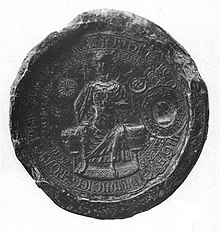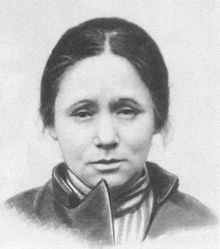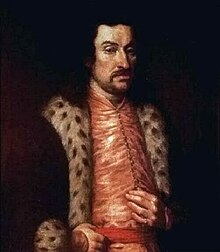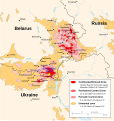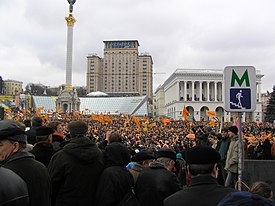Portal:Ukraine
The Ukraine Portal - Портал України
Ukraine Україна (Ukrainian) | |
|---|---|
| ISO 3166 code | UA |
Ukraine is a country in Eastern Europe. It is the second-largest country in Europe after Russia, which borders it to the east and northeast. Ukraine also borders Belarus to the north; Poland and Slovakia to the west; Hungary, Romania and Moldova to the southwest; and the Black Sea and the Sea of Azov to the south and southeast. Kyiv is the nation's capital and largest city, followed by Kharkiv, Dnipro, and Odesa. Ukraine's official language is Ukrainian.
Humans have inhabited Ukraine since 32,000 BC. During the Middle Ages, it was the site of early Slavic expansion and later became a key centre of East Slavic culture under the state of Kievan Rus', which emerged in the 9th century. Kievan Rus' became the largest and most powerful realm in Europe in the 10th and 11th centuries, but gradually disintegrated into rival regional powers before being destroyed by the Mongols in the 13th century. The area was then contested, divided, and ruled by a variety of external powers for the next 600 years, including the Grand Duchy of Lithuania, the Kingdom of Poland, the Polish–Lithuanian Commonwealth, the Austrian Empire, the Ottoman Empire, and the Tsardom of Russia.
The Cossack Hetmanate emerged in central Ukraine in the 17th century but was partitioned between Russia and Poland before being absorbed by the Russian Empire in the late 19th century. Ukrainian nationalism developed and, following the Russian Revolution in 1917, the short-lived Ukrainian People's Republic was formed. The Bolsheviks consolidated control over much of the former empire and established the Ukrainian Soviet Socialist Republic, which became a constituent republic of the Soviet Union in 1922. In the early 1930s, millions of Ukrainians died in the Holodomor, a human-made famine. During World War II, Ukraine was occupied by Germany and endured major battles and atrocities, resulting in 7 million civilians killed, including most Ukrainian Jews.
Ukraine gained independence in 1991 as the Soviet Union dissolved and declared itself neutral. A new constitution was adopted in 1996 as the country transitioned to a free market liberal democracy amid endemic corruption and a legacy of state control. The Orange Revolution of 2004–2005 ushered electoral and constitutional reforms. Resurgent political crises prompted a series of mass demonstrations in 2014 known as the Euromaidan, leading to a revolution, at the end of which Russia unilaterally occupied and annexed Ukraine's Crimean Peninsula, and pro-Russian unrest culminated in a war in Donbas with Russian-backed separatists and Russia. Russia launched a full-scale invasion of Ukraine in 2022. (Full article...)
In the news
- 3 February 2025 – Russian invasion of Ukraine
- Attacks in Russia during the Russian invasion of Ukraine
- A bomb explodes inside a building in Moscow, Russia, killing two people and wounding three. The presumed main target, Armen Sarkisyan, a pro-Russia leader in the Donbas, is among the dead. (Reuters)
- 1 February 2025 – Russian invasion of Ukraine
- Attacks on civilians in the Russian invasion of Ukraine
- A Russian missile strike on a residential building in Poltava, Ukraine, reportedly kills at least fourteen people and injures at least 17 others. A separate strike kills three police officers in Sumy Oblast. (Reuters)
- 31 January 2025 – Russian invasion of Ukraine
- Odesa strikes
- Russian forces launch ballistic missiles at the centre of Odesa and its port, severely damaging numerous civilian buildings, including the historic Bristol Hotel. At least two people are reportedly injured. (Reuters)
- 30 January 2025 – Russian invasion of Ukraine
- Attacks on civilians in the Russian invasion of Ukraine
- A Russian drone strikes a multi-storey apartment building in Sumy, Ukraine, killing nine people and injuring 13 others. (Reuters)
- 29 January 2025 – Russian invasion of Ukraine
- Battle of Chasiv Yar
- Russian forces have captured the city of Chasiv Yar in Donetsk Oblast, Ukraine, after a year of intense fighting for control of the front line city. (The Moscow Times)
Featured pictures
Did you know (auto-generated)

- ... that Volodymyr Kozhukhar, the chief conductor of the National Opera of Ukraine in Kyiv, led Lysenko's opera Taras Bulba and Shchedrin's ballet Carmen Suite?
- ... that after the Ukrainian soprano Olga Bezsmertna won the Neue Stimmen competition in 2011, she was engaged at the Vienna State Opera?
- ... that Ukrainian parties obtained only a fifth of the votes in the 1917 Kiev City Duma election?
- ... that the Temporary Protection Directive went unused until the Ukrainian refugee crisis?
- ... that the Malyuk rifle was originally developed as a private venture under a contract with the Security Service of Ukraine?
- ... that Anatolii Brezvin helped establish a youth hockey championship in Ukraine, and sought to open 60 ice rinks?
More did you know -
- ... that Ukrainian naturalist, lecturer, artist and author John Lhotsky was credited as the first discoverer of gold in New South Wales?
- ... that according to legend, a tunnel leads from the Kamianets-Podilskyi Castle to the Khotyn Fortress which is 20 kilometres (12 mi) away?
- ... that at its first years Kiev Zoo had to move its animals into the food storage of the main Kiev railway station for the winter?
- ... that the Kryvbas economic region in Ukraine is one of the largest iron ore and steel industry centers in Europe?
- ... that the neo-classical Verkhovna Rada building in Kyiv features a hundred-tonne glass dome over the chamber where the Verkhovna Rada of Ukraine convenes to enact legislation?
- ... that although the secular music of Mykola Leontovych was well known in the twentieth century, the Liturgy of St. John Chrysostom was little known because of a ban on sacred music in the Soviet Union?
Selected article -
The Orange Revolution (Ukrainian: Помаранчева революція, romanized: Pomarancheva revoliutsiia) was a series of protests that led to political upheaval in Ukraine from late November 2004 to January 2005. It gained momentum primarily due to the initiative of the general population, sparked by the aftermath of the 2004 Ukrainian presidential election run-off which was claimed to be marred by massive corruption, voter intimidation and electoral fraud. Kyiv, the Ukrainian capital, was the focal point of the movement's campaign of civil resistance, with thousands of protesters demonstrating daily. Nationwide, this was highlighted by a series of acts of civil disobedience, sit-ins, and general strikes organized by the opposition movement.
The protests were prompted by reports from several domestic and foreign election monitors as well as the widespread public perception that the results of the run-off vote of 21 November 2004 between leading candidates Viktor Yushchenko and Viktor Yanukovych were rigged by the authorities in favour of the latter. The nationwide protests succeeded when the results of the original run-off were annulled, and a revote was ordered by Ukraine's Supreme Court for 26 December 2004. Under intense scrutiny by domestic and international observers, the second run-off was declared to be "free and fair". The final results showed a clear victory for Yushchenko, who received about 52% of the vote, compared to Yanukovych's 44%. Yushchenko was declared the official winner and with his inauguration on 23 January 2005 in Kyiv, the Orange Revolution ended. In the following years, the Orange Revolution had a negative connotation among pro-government circles in Belarus and Russia. (Full article...)
In the news
- 3 February 2025 – Russian invasion of Ukraine
- Attacks in Russia during the Russian invasion of Ukraine
- A bomb explodes inside a building in Moscow, Russia, killing two people and wounding three. The presumed main target, Armen Sarkisyan, a pro-Russia leader in the Donbas, is among the dead. (Reuters)
- 1 February 2025 – Russian invasion of Ukraine
- Attacks on civilians in the Russian invasion of Ukraine
- A Russian missile strike on a residential building in Poltava, Ukraine, reportedly kills at least fourteen people and injures at least 17 others. A separate strike kills three police officers in Sumy Oblast. (Reuters)
- 31 January 2025 – Russian invasion of Ukraine
- Odesa strikes
- Russian forces launch ballistic missiles at the centre of Odesa and its port, severely damaging numerous civilian buildings, including the historic Bristol Hotel. At least two people are reportedly injured. (Reuters)
- 30 January 2025 – Russian invasion of Ukraine
- Attacks on civilians in the Russian invasion of Ukraine
- A Russian drone strikes a multi-storey apartment building in Sumy, Ukraine, killing nine people and injuring 13 others. (Reuters)
- 29 January 2025 – Russian invasion of Ukraine
- Battle of Chasiv Yar
- Russian forces have captured the city of Chasiv Yar in Donetsk Oblast, Ukraine, after a year of intense fighting for control of the front line city. (The Moscow Times)
Selected anniversaries for February
- February 4, 1945—February 11, 1945 — Yalta Conference was held between the heads of government of the United States, the United Kingdom, and the Soviet Union; Franklin D. Roosevelt, Winston Churchill, and Joseph Stalin, respectively.
- February 10, 1995 — the first prototype of the Ukrainian Antonov An-70 transport aircraft crashed during a test flight in Kyiv Oblast.
- February 23, 1954 — Viktor Yushchenko, a former President of Ukraine, was born in Khoruzhivka, Sumy Oblast.
Photo gallery
Related portals
Religions in Ukraine
Post Soviet states
Other countries
WikiProjects and collaborations
Associated Wikimedia
The following Wikimedia Foundation sister projects provide more on this subject:
-
Commons
Free media repository -
Wikibooks
Free textbooks and manuals -
Wikidata
Free knowledge base -
Wikinews
Free-content news -
Wikiquote
Collection of quotations -
Wikisource
Free-content library -
Wikiversity
Free learning tools -
Wikivoyage
Free travel guide -
Wiktionary
Dictionary and thesaurus
New articles
Ukrainian editions of Wikimedia projects












